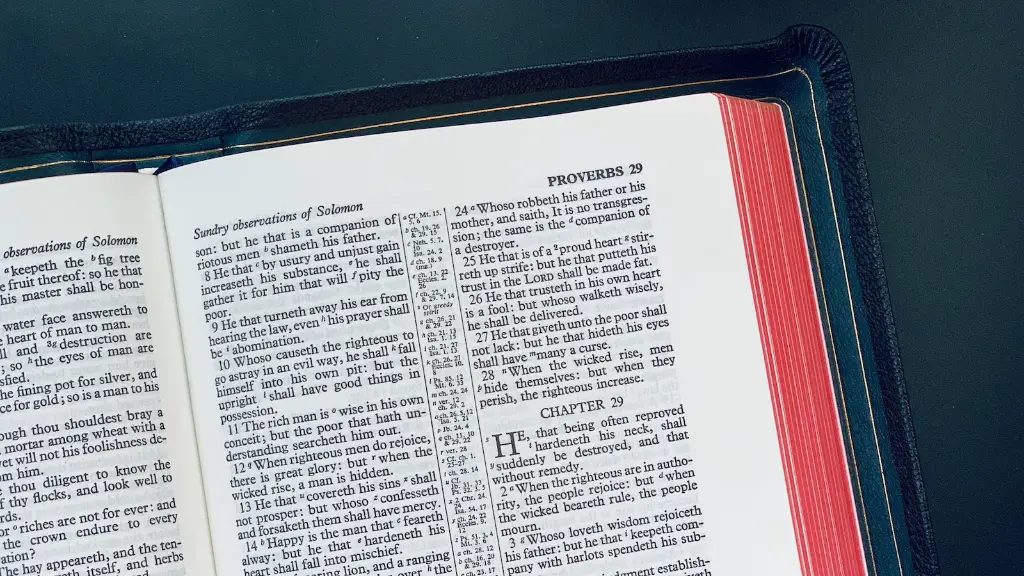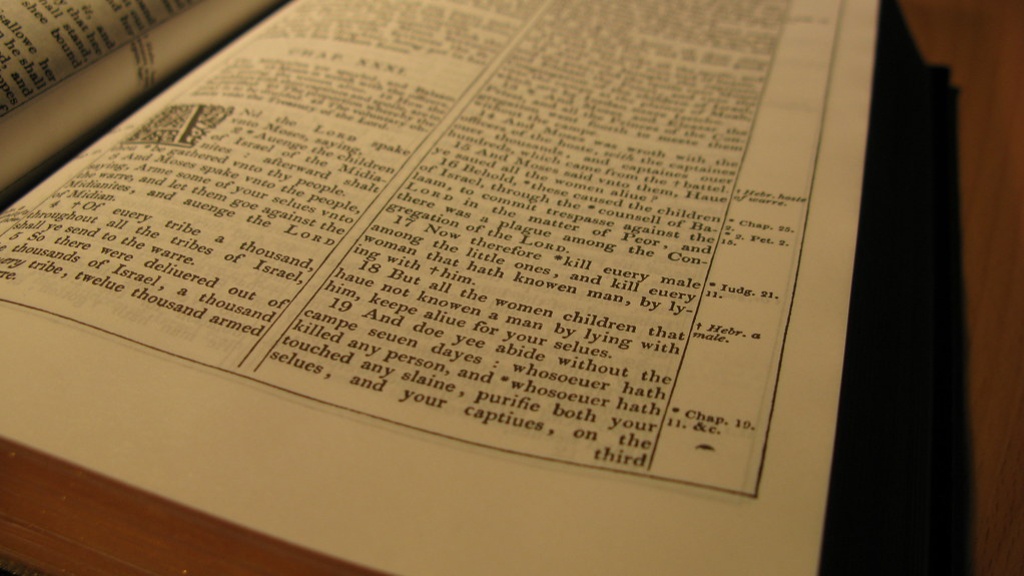The Bible is full of references to the 12 tribes of Israel. The 12 tribes of Israel are mentioned in the Old Testament and actually composed of the descendants of the sons of the prophet Jacob. In the Bible, God made a covenant with Abraham that his 12 sons would become the 12 heads of line of the 12 tribes of Israel. As with all covenants in the Bible, it was important to recognize and honor the promises that God made to his people.
The 12 tribes of Israel are often seen as one of the most celebrated historical achievements, as they developed an ancient nation of their own with a powerful sense of community and national pride. Centuries later they remain a major part of the modern world today and a source of inspiration to millions of people.
The origin of the 12 tribes of Israel is mentioned in the book of Exodus and can be divided into four main groups. The first group is comprised of the descendants of the brothers: Reuben, Simeon, Levi, and Judah. The next group is made up of the sons of Rachel, the wife of Jacob: Joseph and Benjamin. Next are the sons of the two handmaids, Bilhah and Zilpah, which include Dan, Naphtali, Gad, and Asher. Lastly, there is the son of Leah, Issachar. Each of these 12 tribes had its own symbols that displayed its identity and later they became symbols of the nation of Israel as a whole.
The 12 tribes of Israel had a long and tumultuous history. At the time of their origin, they were often divided and failed to unite as a unified group. However, when the time of the monarchy came, the 12 tribes worked together to form powerful kingdoms and the legendary David rose to power. Through his wise rule, the tribes worked together to fight against foreign enemies and their land was expanded. Despite separation, the 12 tribes always came together to fight external enemies when it was necessary. This showed their strong sense of unity and dedication to their nation.
The 12 tribes of Israel are celebrated for their faith and commitment in the Bible. Although they had different backgrounds and beliefs, they worked to form a powerful nation and protect it from outsiders. In addition, the 12 tribes of Israel were seen as representatives of the divine covenant made between God and the descendants of Abraham. The 12 tribes in the Bible are associated with God’s faithfulness and demonstrate how the unity of his people is essential in a spiritual life.
Prominence of 12 Tribes in Today’s World
The 12 tribes of Israel are still prominent today, both in Jewish culture and in Christianity. The 12 tribes act as a symbol of the Israelites’ connection to God and also emphasize their common heritage, even after centuries of separation. In addition, the 12 tribes are seen as symbols of unity, as they portray the importance of coming together and uniting for a common cause. This is still an important message in today’s world, especially in the face of so much division and conflict between countries and cultures.
In the modern world, the 12 tribes have also been used as a means of unifying the Jewish people. Each of the 12 tribes has its own distinct symbol, which is used to represent the spiritual bond between Jews that is so central to their faith. The 12 tribes also emphasize the importance of faith and righteousness, something that is often lost in current society.
The 12 tribes of Israel also serve as an example of strength and perseverance. Despite facing centuries of oppression, exile, and division, the people of these 12 tribes remain dedicated to their faith and to their mission of uniting the Jewish people. The 12 tribes can serve as an inspiration to many individuals and cultures today, as they demonstrate how even in the face of great difficulty people can remain strong and dedicated to a common cause.
Symbols of 12 Tribes of Israel
The 12 tribes of Israel are also famously represented by their individual symbols. These symbols are often used in both Jewish and Christian communities to honor the powerful faith of the 12 tribes. Each of the 12 tribes have their own distinctive symbol, each representing a different aspect of the tribe and its personality. The symbols are often used to promote unity and honor the faith of the 12 tribes.
The symbols of the 12 tribes are also displayed in many works of art and literature. Many works of art depict the 12 symbols in order to celebrate the powerful faith of these 12 tribes. In some cases, the symbols are displayed on flags in order to represent the diversity and strength of the tribes. Works of literature often focus on the symbolism of the 12 tribes in order to emphasize their faith, courage, and determination.
The 12 tribes of Israel and their symbols remain an important part of history. They serve as role models for many and are still praised in modern society. Their commitment to uniting as one spiritual people demonstrates how important it is to stay united and believe in a higher power. The 12 tribes of Israel are an inspiring example of how faith and courage can overcome many difficulties.
Modern Day 12 Tribes of Israel
Today, many Jewish people identify with one of the 12 tribes of Israel. Although the original 12 tribes have been dispersed across the world, their cultural and spiritual heritage still remain a part of many of the modern day descendants. These descendants continue to embrace the faith of the 12 tribes and to keep their traditions alive. For many, the 12 tribes still remain an important part of their culture and faith.
In the modern world, many people are attracted to the power of the 12 tribes of Israel and strive to reclaim the traditions of their ancestors. People of all faiths can learn from the spiritual history of the 12 tribes of Israel and gain a sense of strength and perseverance from their faith and commitment. The origin, symbolism, and beliefs of the 12 tribes of Israel are still studied and honored in many circles today.
The 12 tribes of Israel have left a lasting impression on the history of the world. Despite centuries of separation and intense political, cultural, and religious conflicts, their faith and dedication remain an enduring symbol of hope and strength. The history of the 12 tribes of Israel serves as a reminder of how powerful an unifying faith can be and is an inspiration to many.
Tribal Foundations of Modern Judaism
The 12 tribes of Israel have a major impact on modern Judaism, particularly in regards to the traditions and customs that are still practiced today. Different branches of Judaism incorporate various aspects of the tribal customs, such as laws, spiritual beliefs, and celebrations. The tribal foundations of modern Judaism help to maintain the faith of the 12 tribes and their strong belief in the power of unity.
Modern Judaism largely draws from the customs and beliefs of the 12 tribes of Israel. For example, the contemporary Shabbat, or Sabbath Day, is primarily based on the regulations laid out by the tribes, in particular the tribe of Levi. This is one of the oldest traditions that is still maintained to this day and is a strong reminder of the tribal foundations of Jewish faith.
The 12 tribes of Israel are also credited with bringing the Torah to the Jewish people. The Torah is the basis for Jewish faith and spirituality, and it was the tribal leaders that brought this book of divine law to the Jews. The tribes also maintained the traditions of the oral law, which was later compiled into the Talmud. This code of law laid out many regulations and customs of the Jewish faith and serves as the basis of many of the regulations that are still upheld today.
The 12 tribes of Israel are a major part of the history of the Jewish people and still resonate with many today. Their strong sense of faith and unity demonstrate the importance of spirituality and the power of coming together. The 12 tribes of Israel remain a source of hope and inspiration to many and serve as an example of perseverance and dedication.
Monuments and Symbols of 12 Tribes of Israel
Monuments and symbols of the 12 tribes of Israel have been created throughout the world as a means of honoring their legacy. For many, the monuments serve as a reminder of the faith and commitment of the 12 tribes and remind them of their connection to this ancient history. In addition, these monuments serve as celebrations of the spirit and devotion of these 12 tribes, often showcasing the symbols and stories of their past.
Symbols of the 12 tribes are also used in modern culture, such as the flags of the modern state of Israel. The symbols of the 12 tribes act as an important representation of the Jews’ connection to the ancient past and of their faith in the power of a unified nation. In addition, the symbols are commonly represented in art and literature as a celebration of the tribes’ faith and dedication.
The 12 tribes of Israel left a lasting mark on the world, both physically and spiritually. It is important to remember their faith and their strong sense of unity, as this serves as a reminder of how powerful people are when they come together. The symbols and monuments of the 12 tribes of Israel are symbols of hope, perseverance, and strength.
Study and Recognition of 12 Tribes of Israel
The 12 tribes of Israel are still studied and honored in many circles. There are many books, classes, and seminars that are dedicated to the study and recognition of the 12 tribes of Israel. Through studying their history and culture, many have learned to appreciate the faith and commitment of these 12 tribes. In addition, many have gained a better understanding of the spiritual importance of their traditions and customs.
The 12 tribes of Israel are also celebrated in many works of art and literature. Many works of art focus on the tribal symbols and their importance in the faith of the Israelites. In other works, the flags of the 12 tribes are depicted as a symbol of hope and perseverance. Works of literature often focus on the faith and heroism of the 12 tribes of Israel, showcasing their strength despite centuries of oppression and division.
The 12 tribes of Israel have earned a great deal of respect for their faith and dedication. In recognition of their legacy, many have come to honor the 12 tribes of Israel and appreciate the important role that they have played in the history of the world. While the original 12 tribes have been dispersed across the world, their influence still remains in the hearts and minds of many.
Mentioning 12 Tribes of Israel in Prayers
The 12 tribes of Israel are mentioned in many prayers and hymns. These prayers often focus on the faith and commitment of the tribes and honor their heroic acts of bravery. Prayers often call on the 12 tribes of Israel to act as an inspiration and a source of hope in difficult times. The prayers often emphasize the faith of the Israelites and their strength in facing adversity.
Prayers in the Torah often mention the 12 tribes, particularly in reference to their faith and perseverance. These prayers showcase the power of perseverance and faith in difficult times and emphasize the importance of unity among the 12 tribes. These prayers are often seen as a source of hope and strength in difficult times.
Prayers that mention the 12 tribes of Israel also often appeal to their faith and reliance on a higher power. These prayers often draw on the spirit of the 12 tribes and their commitment to





